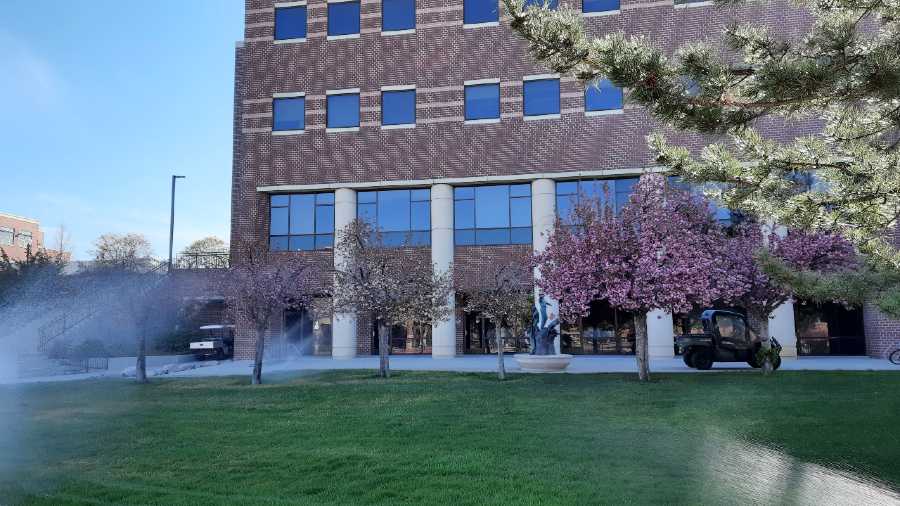Travelling to the United States at the peak of the pandemic, living and working there amongst strangers — the whole prospect of my Fulbright programme this year looked daunting to begin with. That I had not been vaccinated when I set off only added to my worries. But things turned out differently.
I am a teacher in a government-aided school in Calcutta — Sarada Vidya Bhawan — that caters mostly to girls from underprivileged families and belonging to a religious minority group. I teach English. When the announcement for the Fulbright fellowship appeared in 2018, I noticed that there was an opportunity for teachers to apply under the Fulbright Teaching Excellence and Achievement, or FTEA, programme.
As a teacher and a teacher trainer, I have always felt that there is a scope to enable classrooms and training environments technologically — while being sensitive to the digital divide but I was not well-versed in the tools and methods by which this might be achieved.

Sudeshna Dutta (in white) at the University of Nevada Sudeshna Dutta
With the Fulbright application process opening, I decided this fellowship could be a great opportunity to pick up the latest people-friendly digital technologies of learning by spending time in the heart of the American school education system. In a few months, the pandemic unleashed its fury and my belief in my proposal and the stress it lays on technology-augmented blended learning methods was strengthened.
I sent off my application and received a call for an interview at the United States – India Educational Foundation, or USIEF, office in Delhi sometime mid-2019. Once your application has cleared the first stage, get prepared to face the interview board. The questions I got asked covered both my specific proposal and my broader area of practice. One thing to remember here and even earlier is that you should have a long-term vision. You should be able to articulate how your participation in the Fulbright programme will impact, transform and benefit your field of practice back home.
I received the news of the fellowship grant a few months after, but then the pandemic quickly overtook our lives and travel plans were delayed by many months. As soon as things began to look a little better in the US, we were offered dates and, despite the obvious risk, I decided to travel in April this year. Normally, fellowship grantees are called for extensive pre-departure orientation meetings. In our case, much of the pre-travel interactions happened online. The USIEF helps all through the process, and in my case their support and assistance with ticketing and visa in these troubled times meant a lot.
From the time you arrive in the US and even before that, all administrative, logistics and allied support will be provided by the International Research and Exchanges Board (IREX) and your host university. My hosts arranged vaccination for us midway into our quarantine.

I was based at the University of Nevada in Reno, a pretty little city cradled by the dreamy Sierra Nevada. The days were long and often packed with classes, mostly online, but there was ample opportunity to socialise with the fellows from different parts of the world and learn from each other.
As a Fulbright fellow, most of your time in the US will be spent in pursuing the objectives mentioned in your application. In my case, besides attending classes on new technologies and language teaching, I had the opportunity to teach local students both online and at a school set in the middle of a picturesque valley.

Beyond studies and research, the Fulbright experience immerses you in the land. Sightseeing trips to the beautiful Lake Tahoe and the carefully preserved Virginia City were also organised by our hosts. Our work, methods and plans got good exposure before international peers in allied disciplines and practices. I not only learned about the unique teaching experiences of fellows from other nations but also built useful alliances with my American teacher-partner and others, some of which are expected to catalyse my long-term goals of creating a language lab and developing online resources.
My Fulbright teaching fellowship covered all costs including travel. IREX and the local university hosts take good care of me all through the stay, while arranging feedback sessions, wherein I could freely share ideas and concerns. An interesting outcome of the pandemic-related restrictions was that our batch at Nevada University was housed in a massive Victorian style downtown hotel with an in-house casino and a ballroom where we attended many classes. Between getting tested for Covid-19 every week and getting lost among the gamblers and slot machines in our beautiful hotel, my Fulbright experience was quirky, memorable and fun. It has provided me a life’s worth of experience and I am already beginning to implement my learning in professional and activist spheres.










